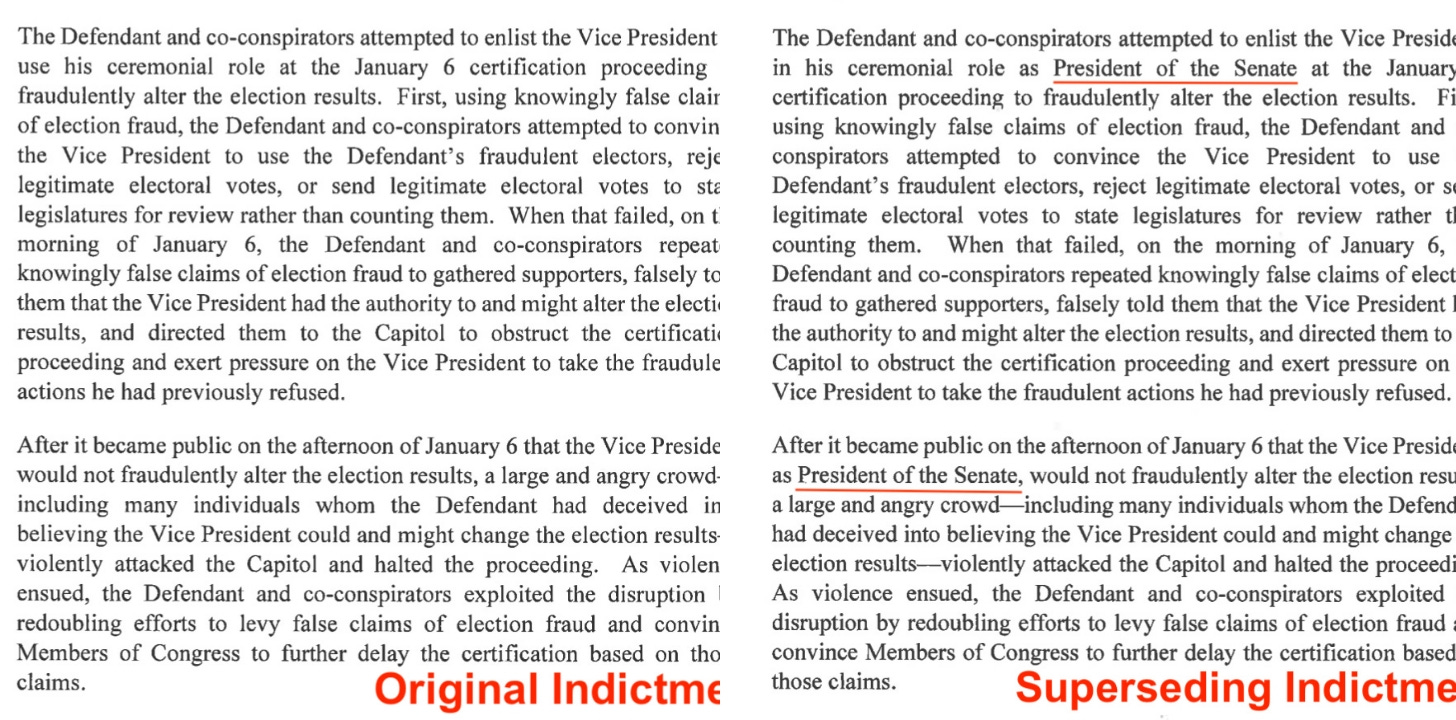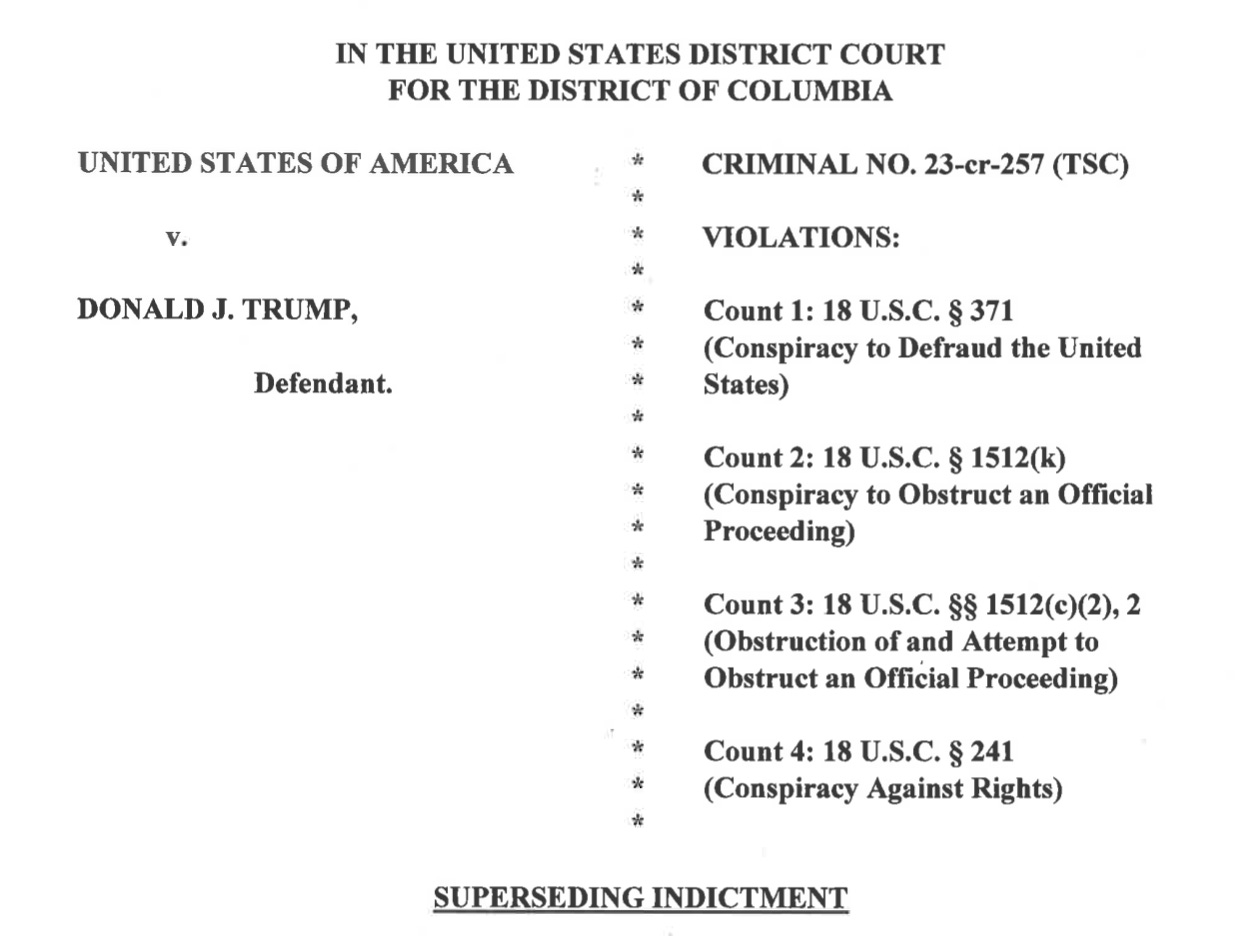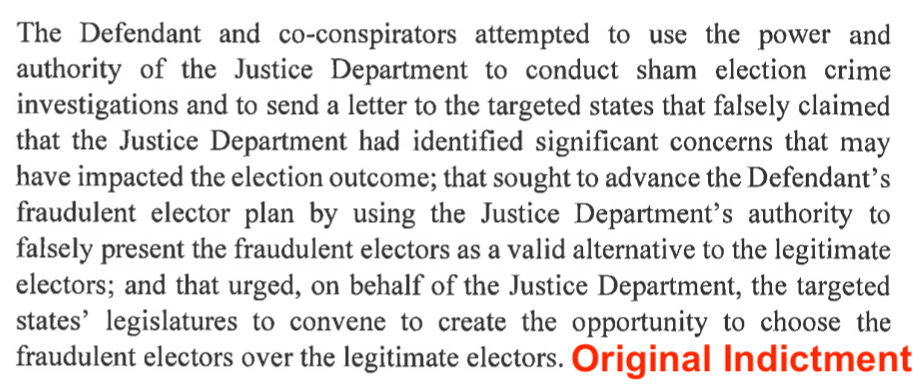Thank you for being one of more than 36,000 people supporting Law Dork with a free subscription! I am so grateful to everyone for reading, subscribing, and sharing Law Dork. That said, my independent legal journalism does cost money to produce. Please consider a paid subscription, as little as $6 a month, to Law Dork today. If you do that, you’ll receive bonus features available only to paid subscribers — and support this essential reporting. I know that not everyone can afford it or prioritize a paid subscription, and, if that’s you, I am so glad you are here! Thanks, Chris Jack Smith attempts to immunity-proof his January 6 Trump indictment. Mostly.Tuesday's superseding indictment in federal court in D.C. is the special counsel's response to July's Supreme Court ruling, which largely favored Trump.Donald Trump was indicted again on Tuesday, a superseding indictment in Special Counsel Jack Smith’s prosecution of the former president for his actions seeking to overturn the 2020 election. The superseding indictment in U.S. District Court in Washington, D.C., was Smith’s response to the U.S. Supreme Court’s July decision holding that former presidents maintain some immunity from criminal prosecution after they leave office, including absolute immunity for acts within what Chief Justice John Roberts described for the court as a president’s “core constitutional powers.” The court also held that a former president also maintains at least a “presumption” of immunity for any official actions within the “outer perimeter” of that president’s duties. Tuesday was not a political fight with the court. It was, in some ways, the opposite. This was Smith and his team saying, “We will take your ruling as it is, and show you how, even under that standard, this indictment can be maintained and proven to a jury.” Tuesday’s superseding indictment brings the same four charges against Trump — conspiracy to defraud the United States; conspiracy to obstruct an official proceeding (as well as obstruction of and attempting to obstruct an official proceeding); and conspiracy against rights, specifically, “the right to vote and to have one’s vote counted” — as he had faced under the original indictment issued last year. Although U.S. District Judge Tanya Chutkan and the U.S. Court of Appeals for the D.C. Circuit both rejected Trump presidential immunity claim, the conservatives on the Supreme Court sided with Trump 6-3 in July on the question of whether Trump could still claim any presidential immunity in response to the indictment. Tuesday was Smith’s next step, and the superseding indictment represents his attempt to immunity-proof the indictment. For the most part. As I detail below, he remained willing to fight for at least one part of the original indictment — relating to former Vice President Mike Pence’s role in all of this — even if it will mean more legal fights going forward. It is, let’s be clear, not a sign that this will be moving quickly. Not at all. This is, instead, a sign that Smith plans to continue forward with this prosecution after the election — if Trump loses in November. DOJ-related claims are goneThe original indictment included a five-page section describing Trump’s attempts to “leverage the Justice Department” against state officials. In the July immunity decision, however, the Supreme Court held that Trump was immune from prosecution on that basis. Roberts wrote that these discussions with members of the Justice Department were part of those “core constitutional powers,” so this portion of the original indictment would not have stood. Tuesday’s superseding indictment responded to that by eliminating that entire five-page section, and other references to it, completely. As such, it also eliminated mentions of “co-conspirator 4,” the person within the Justice Department who worked with Trump to support his efforts and has been identified as former Justice Department official Jeffrey Clark. The removal of this section and those mentions were the biggest changes between the 2023 indictment and Tuesday’s superseding indictment. Evidence ruling falloutFurther though, a 5-4 majority in July — with Justice Amy Coney Barrett breaking off from the other conservatives — held that acts immune from prosecution cannot be introduced into evidence at all. As Roberts wrote, “If official conduct for which the President is immune may be scrutinized to help secure his conviction, even on charges that purport to be based only on his unofficial conduct, the ‘intended effect’ of immunity would be defeated.” To that, Smith responded in the superseding indictment on Tuesday by making four primary changes:
Two other aspects of the initial indictment were excised:
As a result, the superseding indictment added some information:
About PenceFinally, there was one potentially significant addition. Tuesday’s indictment added multiple references to then-Vice President Mike Pence acting “as President of the Senate” on January 6.  Roberts specifically referenced this portion of the original indictment in July’s immunity decision, noting, “Despite the Vice President’s expansive role of advising and assisting the President within the Executive Branch, the Vice President’s Article I responsibility of ‘presiding over the Senate” is “not an ‘executive branch’ function.’” Roberts, nonetheless, also noted how “the President may frequently rely on the Vice President in his capacity as President of the Senate to advance the President’s agenda in Congress.” As such, this would be an area where, as Roberts put it for the court, it would be “the Government’s burden to rebut the presumption of immunity.” I highlight the continued inclusion of this section and particular addition made to it because it showed that, unlike the removal of sections of the indictment where the court left Smith no real other choice, Smith was — and will be — willing to defend this part of the indictment even though it meant Smith would need to rebut a presumption of immunity for Trump to keep it. Lest there be any doubt that Smith is willing to fight to keep this in the indictment, Smith added a paragraph to the introduction of the indictment — and it was about Pence. Pence, Smith is stating, was not an executive branch official as it relates to the superseding indictment for two reasons: He was a political candidate and President of the Senate. Smith appears to be eager to argue that, as to Trump’s efforts to “enlist” Pence, the presumption of immunity should be considered rebutted. You’re a free subscriber to Law Dork, with Chris Geidner. To further support this independent legal journalism, please consider becoming a paying subscriber. |





